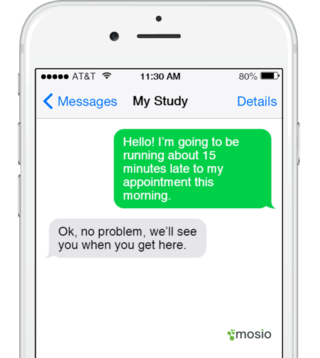REDCap/Mosio Integration
| Location | Server Name | URL | Mosio Integration |
|---|---|---|---|
| Yale | REDCap I | redcap.med.yale.edu | YES |
| Yale | REDCap II | redcap.research.yale.edu | YES |
| YNHH | YNHH Standard | redcapynh.ynhh.org | NO |
| YNHH | 21 CFR Part 11 | redcapynh-p11.ynhh.org | NO |


Mosio is a third-party platform for communicating with research participants by text message. It allows you to send automated and personalized text messages, managed on the Mosio website or through REDCap, without the need for a physical phone.
Researchers can use Mosio to:
Mosio is a fee-based service.
Mosio can be used with REDCap integration or as a stand-alone platform.
When integrated, REDCap can automatically send survey invitations, reminders, and appointment texts through Mosio, linking communications to participant records.
Without integration, Mosio also functions independently, allowing researchers to manually schedule or send messages, manage conversations, and set reminders through its web dashboard. Both options support participant communication; the key difference is whether automation and data linkage to REDCap are required.
| Location | Server Name | URL | Mosio Integration |
|---|---|---|---|
| Yale | REDCap I | redcap.med.yale.edu | YES |
| Yale | REDCap II | redcap.research.yale.edu | YES |
| YNHH | YNHH Standard | redcapynh.ynhh.org | NO |
| YNHH | 21 CFR Part 11 | redcapynh-p11.ynhh.org | NO |
Each study team is responsible for managing its own Mosio plan. To review available subscription options, visit Mosio REDCap Integration Plans
To select a plan, consider the following:
Note: Researchers at Yale do not need to set up a Research Center Direct (RCD) License. Cybersecurity and integration requirements for Mosio are coordinated centrally through Yale’s Health Science IT.
The Campaign Registry (TCR) is a national system established by Congress and the FCC to oversee and validate commercial text messaging. Any organization sending text messages from a 10-digit long code (10DLC) through application-to-person (A2P) messaging must have an approved campaign on file. Unregistered numbers risk being flagged as spam and blocked by mobile carriers. Repeated unregistered messaging may result in permanent blocking.
Mosio manages this registration process for you. Approval typically takes about one week from the time of submission.
Follow these steps to register your campaign:
Researchers must obtain approval from the IRB to ensure adequate measures are taken to protect participants. Plans for text messaging must be described in the research protocol.
Your research protocol must clearly describe the study’s text messaging plan, including: